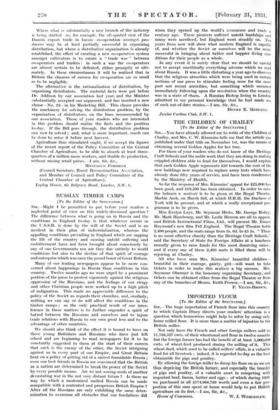RUSSIAN TIMBER CAMPS
[To the Editor of the SPECTATOR.]
Sin,—Might I be permitted to put before your readers a neglected point of view on this widely-discussed question ? The difference between what is going on in Russia and the conditions in England to-day is that whatever occurs in the U.S.S.R. is done by the will of the Soviet and is an incident in their plan of industrialization, whereas the appalling conditions prevailing in England which are sapping the life of the country and causing untold suffering and embitterment have not been brought about consciously by any of our Governments nor are they due entirely to world conditions but also to the decline of that spirit of courage and enterprise which was once the proud boast of Great Britain.
Many of our leading newspapers appear to be more con- cerned about happenings in Russia than conditions in this country. Twelve months ago we were urged by a prominent portion of the press to protest vigorously against the religious oppression of the Russians, and the feelings of our clergy and other Christian people were worked up to a high pitch of indignation. This made no appreciable difference to the policy of the Soviet as regards their churches, and, similarly, nothing we can say or do will affect the conditions in the timber camps ; so the only practical result of our inter- ference in these matters is to further engender a spirit of hatred between the Russians and ourselves and to injure trade relations with Russia to our own great loss and to the advantage of other countries.
We should also think of the effect it is bound to have on those young Britishers and Russians who have just left school and are beginning to read newspapers for it to be constantly suggested to them at the start of their careers that each is the enemy of the other, the Soviet intriguing against us in every part of our Empire, and Great Britain bent on a policy of getting rid of a united formidable Russia ; even our best friends in Russia are convinced that the British as a nation are determined to break the power of the Soviet by every possible means. Arc we not sowing seeds of another devastating war in the not very distant future ? Is there no way by which a modernized unified Russia can be made compatible with a contented and prosperous British Empire ? After all the Russians are only exhibiting the same deter- mination to overcome all obstacles that our forefathers did
when they opened up the world's commerce and trade a century ago. These pioneers suffered untold hardships and Many were sacrificed, but England went steadily on. Tea years from now will show what modern England is capable of, and whether the Soviet or ourselves will be the more successful in bringing about better and happier living con. ditions for their people as a whole.
In any event it is surely clear that we should be careful not to accept uncritically everything adverse which we read about Russia. It was a little disturbing a year ago to discover that the religious atrocities which were being used in certain sections of our press to stimulate feeling were for the most part not recent atrocities, but something which occurred immediately following upon the revolution when the country was in a state of chaos. A Russian Bishop living in London admitted to my personal knowledge that he had made use of such out-of-date stories.—I am, Sir, &c.,
Junior Carlton Club, S.W. 1. HENRY E. METCALF.











































 Previous page
Previous page